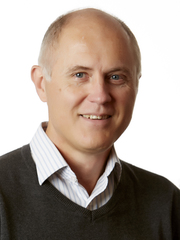Professor Richard Eckard to equip production vets with tools for climate-impacted future at the ACV & NT Division Conference
07 Mar 2023
We’ve all heard about sustainable agriculture, but what about the new kids on the block? CN30, nature-positive, ABSF, asparagopsis, 3NOP, climate variability – just to name a few! What do they mean for our clients, the health and welfare of our livestock and Australia’s production systems?
Australian Cattle Veterinarians (ACV) have invited Professor Richard Eckard to the ACV & NT Division conference to explore these issues and equip production vets with tools to assist their clients to succeed in climate-impacted future.
Image: Professor Richard Eckard
Professor Richard Eckard has a very long job title, Professor of Sustainable Agriculture at the University of Melbourne and Director of the Primary Industries Climate Challenges Centre (PICCC), but a very simple message: coping with climate change will be the biggest challenge the agriculture industry will face in the near future. If production veterinarians want to stay in the game, they need to understand the playing field.
Livestock both contribute – and are vulnerable to – the changing climate, and Professor Eckard says the main focus of his research is to understand how livestock industries can become more sustainable.
For the veterinary industry specifically, Professor Eckard states that the challenges include the animal health implications of both the physical impact of climate change like heat stress in animals, but also a number of the mitigation strategies like dietary supplements that will need rigorous evaluation before they would be considered safe for animals. To ensure these products are safe and commercially viable, Professor Eckard believes that significant due diligence is needed from a veterinary point-of-view.
Professor Eckard began his career in sub-Saharan Africa working in livestock production systems, before completing a postdoctoral fellowship at the University of Tasmania related to rainfall systems and their impact on agricultural systems. Following this, he moved to the University of Melbourne where he has devoted his career to researching and promoting sustainability in livestock production.
In his role at PICCC, the focus is on accounting for claims towards future low emissions production and providing practical options for livestock producers. Professor Eckard has successfully brokered a broad range of projects covering all aspects of adaptation as well as mitigation for example, PICCC were the first to establish the methodology to account for greenhouse gas emissions which resulted in validation of a series of free tools, available to all sectors of Australia,
Asked about the specific challenges that he sees in his role, he highlighted the disconnect between research and producers.
“Agriculture locates itself in regions because of the climate, and the system is designed to cope with rainfall patterns and soil types,” Professor Eckard says. “The Australian agricultural landscape will look very different under a 1.5 degree rise in temperature… it will not be a disastrous outcome, it will just need to be an adapted outcome.”
“Before policy can adopt our research,” he continues, “it needs to be published in peer-reviewed literature, which might not be relevant to farmers directly, but indirectly affects the policy environment in which they have to operate in the future."
Veterinarians are uniquely qualified to assist producers to understand their carbon footprint and prepare their production systems for climate variability.
Professor Eckard will be presenting a ‘DIY Farm Carbon Audit’ workshop at the upcoming ACV & NT Division Conference. He aims to ensure the correct information is being communicated, as well as empowering the farm advisory sector to assist producers to understand their carbon footprint.
Participants will be guided through a simple carbon accounting exercise and Professor Eckard encourages attendees to bring along a real-life case study in order to walk away with a tangible result - this is a unique opportunity to gain practical knowledge and join the conversation.
His presentation during the conference scientific program, ‘Carbon neutral farming by 2050’, will answer questions like who is asking us to be carbon neutral, what are the mechanisms for accounting our progress towards this target, what are the options to reduce livestock methane and what are the key animal health and welfare concerns in this transition?
All attendees will benefit from Professor Eckard’s ability to translate complex science into simple messages – enabling vets to assist producers and policy makers to understand their carbon footprint and implement sustainable farming systems now and into the future.
Professor Eckard will be leading the ‘DIY Farm Carbon Audit’ workshop on Tuesday 28 March 2023 at 1:30pm, and presenting ‘Carbon neutral farming by 2050’ on Wednesday 29 March 2023 at 8:45am.
The theme of the conference is ‘Finding New Ways’. For more information and to see the program, please click here.

